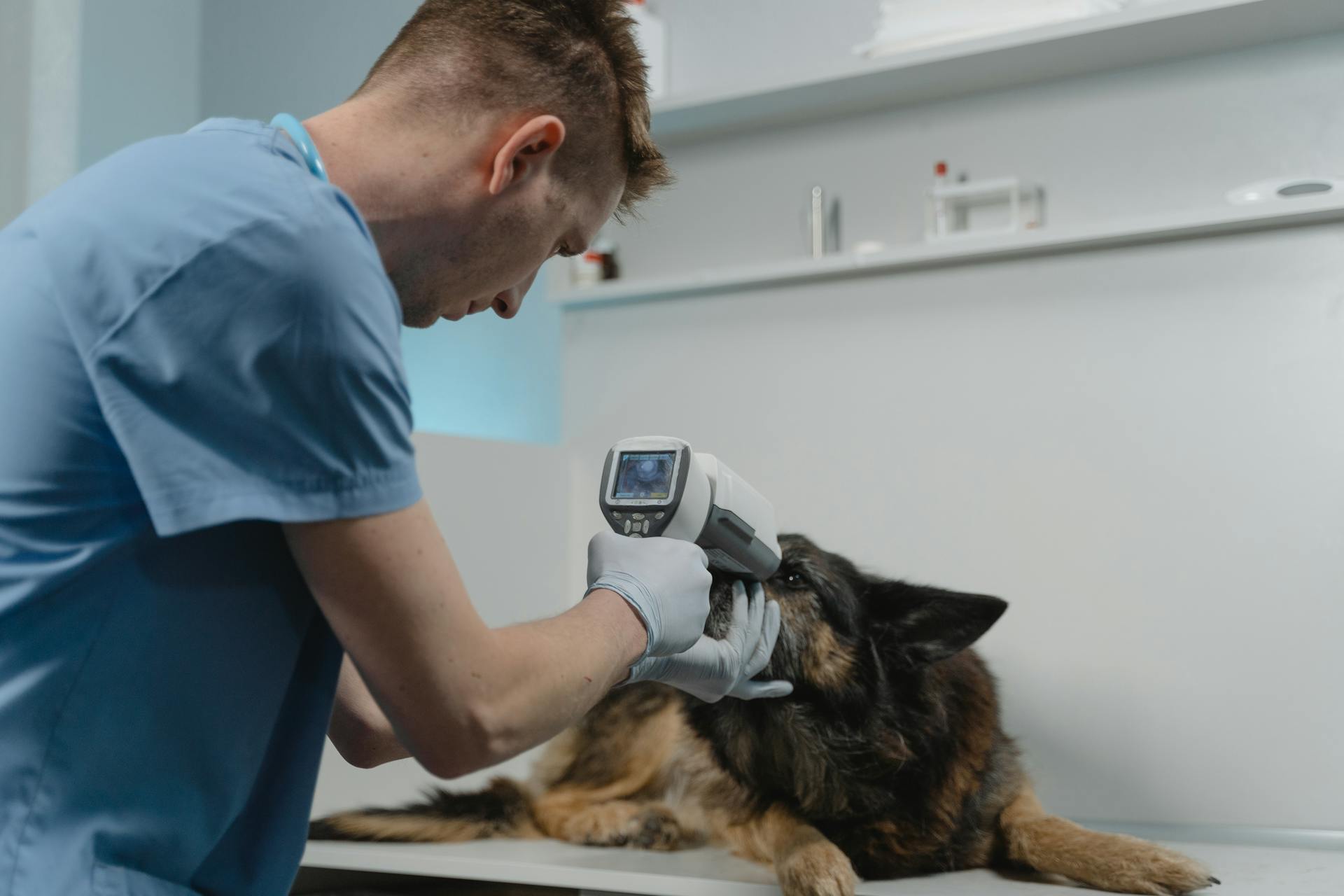
If you're like me, you've probably reached for over the counter medications to help your furry friend feel better when they're not feeling well. Luckily, there are some dog-friendly options available.
For example, diphenhydramine, found in Benadryl, can be used to treat allergies and itching in dogs. It's also used to help with motion sickness.
However, it's essential to use caution when giving your dog any medication, and always consult with a veterinarian before administering anything new. Always check the dosage carefully to avoid overmedicating your pet.
Some common over the counter medications that are safe for dogs include hydrocortisone cream for skin issues and calamine lotion for itching and irritation.
Check this out: What Can You Feed Dogs Instead of Dog Food
Over-the-Counter Medications
If you're looking for over-the-counter medications that are safe for your furry friend, there are a few options to consider. Consult your veterinarian for dosage instructions before giving your dog any medication.
Buffered aspirin can be used for pain relief, but only in small doses and with a full meal to prevent stomach upset. Dogs weighing less than 10 lbs. should not be given aspirin due to the increased risk of bleeding and stomach ulcers.
Antihistamines like Benadryl are often safe for canine consumption and can relieve symptoms of hives and allergic reactions. However, only administer medications that solely contain antihistamine and avoid giving decongestants.
Artificial tears eye drops can provide temporary relief for red and irritated eyes, but if your dog's eyes are severely swollen or leaking discharge, seek veterinary attention immediately.
Motion sickness medication like Dramamine can help soothe your dog's stomach during car rides, but human motion sickness meds may not be as effective for dogs.
Antacids like Pepto-Bismol can be used to treat indigestion, but it's best to avoid feeding your pup while administering the medication and provide fresh water.
Some other safe over-the-counter medications for dogs include antidiarrheal drugs like Imodium (except for certain breeds), topical antibiotic ointment like Neosporin, and hydrocortisone cream for bug bites and itchy skin.
Here's a quick rundown of some safe over-the-counter medications for dogs:
- Buffered aspirin (small doses, with a full meal)
- Antihistamines (like Benadryl)
- Artificial tears eye drops
- Motion sickness medication (like Dramamine)
- Antacids (like Pepto-Bismol)
- Antidiarrheal drugs (like Imodium, except for certain breeds)
- Topical antibiotic ointment (like Neosporin)
- Hydrocortisone cream
Additionally, medications like Pepcid-AC, Tagamet, and Zantac can be used to treat or prevent heartburn and stomach ulcer-related symptoms in dogs. Always consult with your vet to determine the correct dosage for your furry friend.
Pain Relief and Inflammation
Glucosamine and chondroitin are natural substances that can be used to support joint health and reduce inflammation in dogs. They're available over the counter in various forms, including tablets, chews, and liquids.
Glucosamine and chondroitin are often used to treat mild pain from conditions like hip dysplasia and spinal cord injuries. These supplements can be a good option for long-term treatment.
Some popular over-the-counter options include glucosamine and chondroitin supplements, as well as fish oil. Fish oil has anti-inflammatory benefits and can be used to treat a variety of health issues, including osteoarthritis and skin disease.
Here are some common over-the-counter supplements for pain relief and inflammation:
NSAIDs
NSAIDs can be a safe and effective way to control pain and inflammation in dogs, but it's essential to work closely with your vet to ensure your pup is a good candidate for these medications.
Only give your dog NSAIDs that your vet has approved, as some pets may not be able to take them due to pre-existing liver or kidney disease.
Additional reading: Vet Dogs Dog Treats
NSAIDs work by decreasing a pup's bodily response to inflammation, which reduces pain. They may be used in various ways, such as after surgery or for diseases like hip dysplasia and osteoarthritis.
Some common NSAIDs used by vets include Carprofen (Novox or Rimadyl), Deracoxib (Deramaxx), Firocoxib (Previcox), and Meloxicam (Metacam).
Here are some examples of commonly prescribed NSAIDs:
Always monitor your pup closely for side effects and signs of toxicity, and call your vet immediately if you suspect an overdose situation or if your pet is not tolerating the medication well.
Joint Pain Supplements
Joint Pain Supplements can be a great way to help alleviate your dog's discomfort.
Glucosamine is a natural substance used to protect cartilage, making it a helpful supplement for mild pain from hip dysplasia and spinal cord injuries. It comes in many forms, including tablets, chews, and liquids, and is available over the counter.
Chondroitin is another natural substance used to protect a dog's cartilage, and is also used for mild pain from conditions like hip dysplasia and spinal cord injuries. Like glucosamine, it comes in various forms and is available over the counter.
A fresh viewpoint: Training Dog to Not Jump on Counter
Adequan is an injectable product that's used for pain from osteoarthritis, and has anti-inflammatory benefits. However, you'll need a prescription from your vet to get this supplement.
Fish oil is a natural substance with anti-inflammatory benefits, and is used for pain from osteoarthritis, as well as other conditions like skin disease and heart disease. You can find fish oil for pups over the counter.
Here are some common joint pain supplements for dogs:
- Glucosamine: protects cartilage and comes in various forms, available over the counter
- Chondroitin: protects cartilage and comes in various forms, available over the counter
- Adequan: injectable product for pain from osteoarthritis, requires a prescription from your vet
- Fish oil: has anti-inflammatory benefits and is used for various conditions, available over the counter
Allergies and Skin Issues
Allergies and Skin Issues can be a real challenge for dogs. Antihistamines like Benadryl (diphenhydramine) are commonly used to relieve symptoms.
Claritin (loratadine) and Zyrtec (cetirizine) are also effective options. They're usually safe for dogs but can cause drowsiness or hyperactivity.
To use these medications effectively, make sure to follow the dosage instructions. For example, Benadryl can be given at 1 milligram/pound of body weight, twice daily, while Claritin is approximately 0.1 to 0.5 milligram/pound of body weight, given once to twice daily.
Here's a quick reference guide to antihistamines for dogs:
Antihistamines (Benadryl)
Antihistamines (Benadryl) are a great option for relieving allergy symptoms in dogs. They're commonly used to treat itchiness, hives, swelling, and redness.
Benadryl is effective in treating seasonal allergies, food allergies, environmental allergies, and allergic reactions to bites from snakes and insects. It's also used to treat anxiety and motion sickness in dogs.
The typical dosage for Benadryl is 1 milligram/pound of body weight, given twice daily. However, the dosage can vary depending on your dog's age, weight, and health conditions.
Some common side effects of Benadryl include drowsiness, dry mouth, urinary retention, and hypersalivation. Rare side effects include increased heart rate and rapid breathing.
The Merck Veterinary Manual recommends administering 2-4 milligrams of Benadryl per kilogram of body weight, two to three times a day. However, this dosage should be determined by a veterinarian, as it may vary depending on your individual dog.
If your dog has any of the following conditions, consult with your veterinarian before using Benadryl: glaucoma, cardiovascular disease, hypothyroidism, seizure disorders, hypertension, allergic lung disease, or pregnancy.
Here's a summary of the common antihistamines used to relieve allergy symptoms in dogs:
Steroid Topical Preparations
Steroid topical preparations can be used to relieve itching caused by superficial wounds or insect bites in dogs.
These preparations, available over the counter, can decrease the itching felt by your dog.
However, using steroids can delay the healing rate of the wound.
If your dog's wound hasn't cleared after a few applications, it's a good idea to have it checked by your dog's veterinarian.
Antibiotic Ointments & Topical Creams
You can use over-the-counter antibiotics and other topical creams for dogs to treat minor cuts and scrapes. Just be sure to clean your dog's wound before applying any antibiotic ointment.
Antibiotic creams like Neosporin are safe for dogs, as long as they don't contain steroids.
To prevent your dog from licking off the ointment, cover the wound after applying the cream.
Hydrocortisone is another popular OTC topical cream that's safe for dogs to relieve itchy, raw or irritated skin. You can apply a small amount up to two times daily.
Digestive Issues
If your furry friend is experiencing digestive issues, there are some over-the-counter medications you can consider. These medications can help alleviate symptoms like heartburn and diarrhea.
Pepcid-AC, Tagamet, and Zantac are common OTC medications that can help treat or prevent heartburn and stomach ulcer-related symptoms in dogs. They're generally safe and effective.
For diarrhea, Imodium is a safe option for most dogs and cats. The dosage is 1 milligram per 20 pounds of weight, every 4-6 hours.
Some breeds related to Collies, such as Shelties, Australian Shepherds, and Long-haired Whippets, may have adverse reactions to Imodium, so it's best to avoid giving it to them.
Remember to consult with your vet before giving your dog any medication, especially if their symptoms persist or worsen.
If this caught your attention, see: Dog Diarrhea Medications
Antacid Medications
Antacid Medications can be a lifesaver for your furry friend. They help alleviate heartburn and stomach ulcer-related symptoms.
Pepcid-AC, Tagamet, and Zantac are common OTC medications that are generally effective and safe for dogs (and cats). You can administer the correct dosage once or twice a day.
Tablet dosages vary for each of these OTC meds, so consult with your vet to know how much to give your dog.
Pepto-Bismol
Pepto-Bismol is a popular over-the-counter medication that can be used to treat diarrhea, vomiting, and an upset stomach in dogs. It's safe for use in dogs, but not for cats.
The active ingredient in Pepto-Bismol is bismuth subsalicylate, which can cause gastrointestinal upset and lead to gastric bleeding if given in excess.
To use Pepto-Bismol safely, give your dog 1 teaspoon per 10 pounds of weight, every 6-8 hours for 24 hours.
Keep in mind that the salicylate in Pepto-Bismol can cause stomach issues, so only give your dog a few doses.
Sources
- https://www.petmd.com/dog/general-health/pain-meds-for-dogs
- https://www.akc.org/expert-advice/health/benadryl-for-dogs/
- https://wagwalking.com/wellness/over-the-counter-medications-that-are-safe-for-your-dog
- https://popandted.co.uk/blogs/news/over-the-counter-medicines-that-are-safe-for-your-dog
- https://www.caninejournal.com/over-the-counter-medicine-for-dogs/
Featured Images: pexels.com


